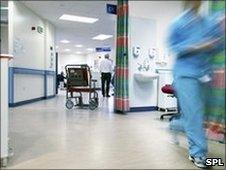NHS management 'weak', warns health committee
- Published

MSPs questioned whether NHS productivity had increased
MSPs have warned that "fundamental weaknesses in NHS management" may be influencing bad spending decisions in the health service.
Holyrood's health committee said more staff were being employed, yet there was no increase in productivity.
The committee's findings came after an investigation into the level of cash given to health boards to spend in 2010-11.
Ministers warned the NHS would have to make savings in tight financial times.
The UK Budget has given rise to cuts concerns in sectors like the NHS, although Westminster ministers have pledged to protect NHS budgets from its spending cuts to reduce the UK's £155bn deficit.
The NHS accounts for about a third of the Scottish government's £30bn annual budget, with individual boards responsible for spending about 75% of the allocation.
SNP MSP Christine Grahame, convener of the cross-party health committee, expressed concern that current spending safeguards were failing to make the health service more efficient.
"More staff have seemingly been appointed without any comparable rise in productivity because of the way budgets have been managed in the past," she said.
"This raises a number of questions, including what criteria are being used to approve new spending and what standard of evidence is expected to support a spending plan."
Ms Grahame added: "The committee is concerned that mechanisms in place for holding NHS boards to account don't adequately address efficiency within the service.
"We're also concerned that reductions in budget growth, against a background of continuing rises in demand and inflationary pressures, will place the NHS under great strain."
Savings plan
Scottish Health Secretary Nicola Sturgeon said the number of NHS operations had increased by nearly 40,000 since 2006-07, and pointed out the health service was given a funding increase - but warned budgets would be tight for the "foreseeable future".
"Health boards should be keenly aware that the focus of the NHS is on protecting frontline services in this tough financial climate," she said, adding: "That's why efficiencies have been and will continue to be made.
"Efficiencies are not just about saving money, but about ensuring the best possible services for patients at all times."
Ministers have told Scottish health boards to make savings of £367m in 2009-10, on top of £204m already saved the previous year.
The committee also called on the NHS to better inform people of the reasons behind "contentious" cuts decisions and asked for a reassurance from the health service that savings could be made without damaging quality.
Responding to the findings, the Royal College of Nursing (Scotland) said health boards needed to come up with "some serious answers" to the problems outlined in the report if they were going to succeed in their mission to cut costs but not compromise patient care.
Meanwhile, Scottish Labour said Ms Sturgeon needed "to get a grip of the situation, so that we know which staff are making a vital contribution to patient care and what we need to do to protect frontline services".
And the Conservatives said they agreed with the committee "that what matters is patient outcomes, not inputs like staff numbers. However, service redesign must be carried out in full consultation with the public and NHS workers".
- Published28 June 2010
- Published3 June 2010